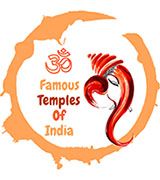1500 Yrs Old Siruvapuri Murugan Temple
Siruvapuri Murugan Temple is a Hindu temple dedicated to Lord Muruga, the son of Lord Shiva and Parvati. It is located in the village of Siruvapuri, about 40 km from Chennai, Tamil Nadu, India. The temple is believed to be over 1,500 years old and is one of the most important Murugan temples in the region.
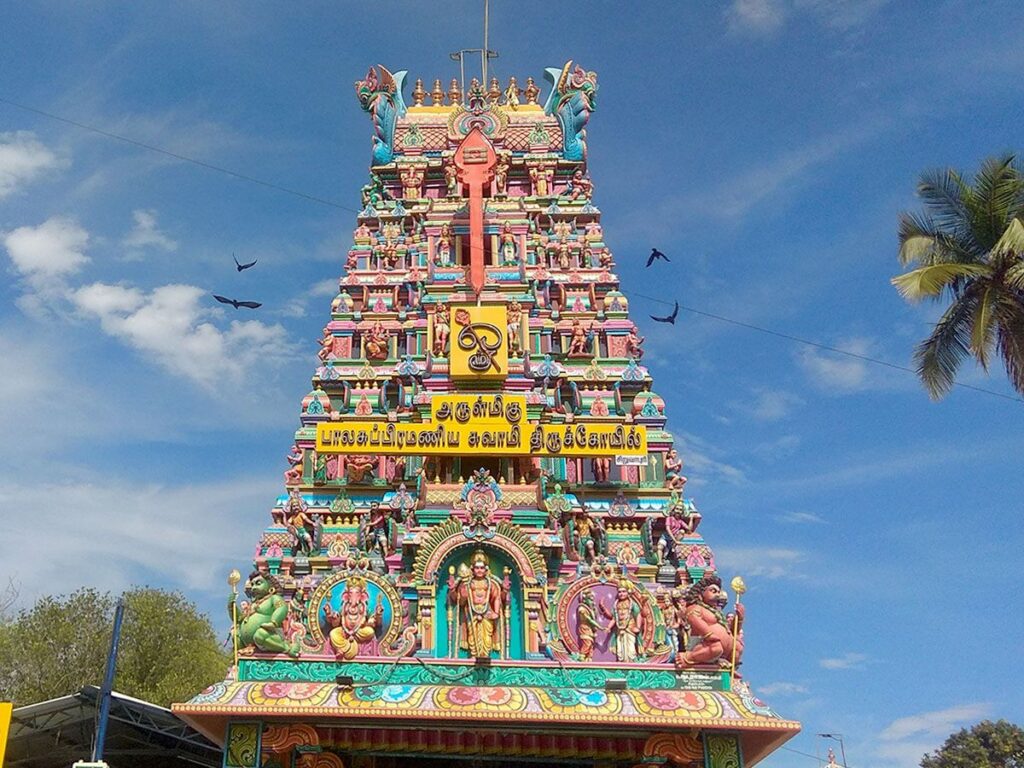
Contents
- 1 Siruvapuri Murugan Temple History:
- 2 Legend of Siruvapuri Sri Balamurugan Temple:
- 3 Myths and beliefs of Siruvapuri Murugan Temple:
- 4 Significane of Siruvapuri Murugan Temple:
- 5 Siruvapuri Murugan Temple Timing and Rituals:
- 6 Places to visit near Siruvapuri Murugan Temple:
- 7 FAQ:
- 8 How to reach Siruvapuri Murugan Temple:
- 9 Google Maps:
Siruvapuri Murugan Temple History:
The history of the temple is associated with the Ramayana epic. According to legend, the sons of Rama, Lava and Kusa, lived in this area. Once, when Rama was passing through this place, the children fought a war with him, not knowing that he was their father. As the young children waged a war here, the place was called as Siruvar Por Puri. (Siruvar means children, Por Puri means waging a war, in Tamil). This place is now called as Chinnambedu, which originally was Siruvar Ambu Edu (children who took their arrows for the fight).
The temple is believed to have been built by the Chola kings. The main deity of the temple is Lord Muruga, who is worshipped in the form of Valli Manalar. Valli Manalar is a form of Muruga that is depicted as a young boy, married to his consort Valli. The temple also houses shrines dedicated to Lord Shiva, Parvati, and Ganesha.
The temple is a popular pilgrimage destination for Hindus from all over the world. The temple is especially crowded during the annual festival of Skanda Shashti, which is celebrated in the month of November.
Here are some of the important features of the temple:
- The main deity of the temple, Valli Manalar, is a beautiful and imposing idol. The idol is made of granite and is about 6 feet tall.
- The temple complex is spread over a large area and houses several shrines dedicated to other deities.
- The temple is well-maintained and has a serene atmosphere.
Read More>> Skandagiri Temple of Sri Subrahmanya Swamy
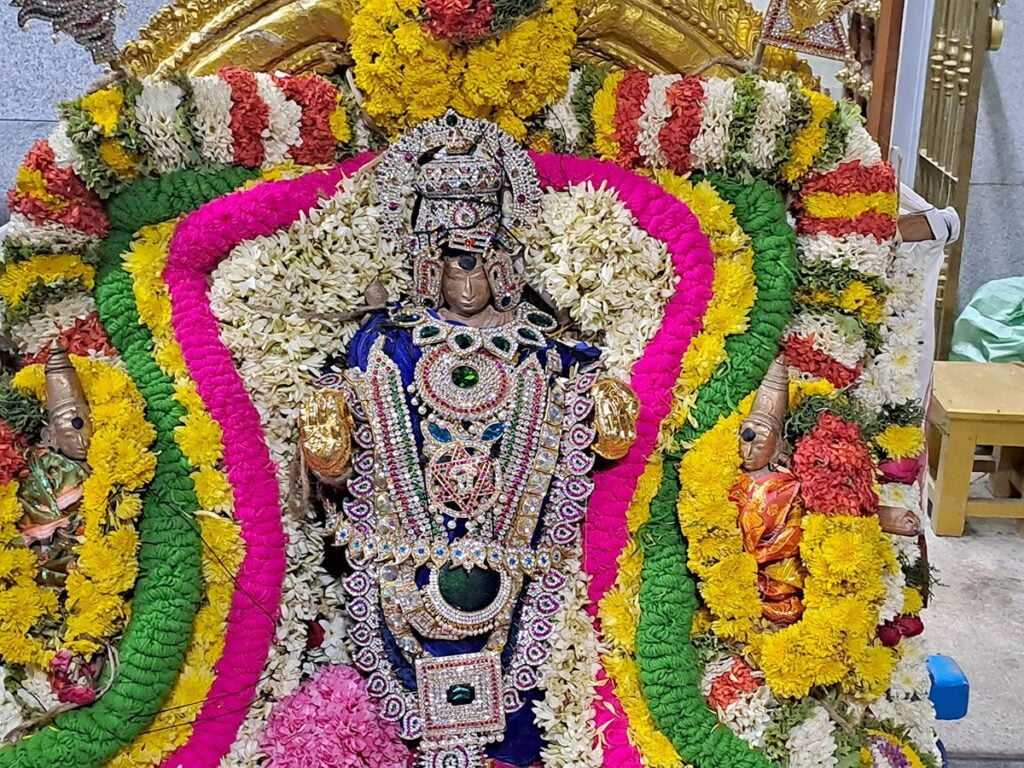
Legend of Siruvapuri Sri Balamurugan Temple:
The legend of the temple is said to have originated in the Ramayana epic. According to the legend, the sons of Rama, Luv and Kush, once lived in this place. One day, Rama was passing through this place when he was attacked by Luv and Kush. Rama, not knowing that they were his sons, fought back. The battle was fierce, and the ground was littered with arrows. As a result, the place came to be known as “Siruvar Por Puri” (meaning “children waging war”).
The place was later renamed “Chinnambedu”. The temple was built by the Vijayanagara kings in the 16th century. The main deity of the temple is Lord Murugan in the form of Valli Manalar, a standing posture with his consort Valli.
The temple is believed to be a powerful place of worship. It is said that Lord Murugan can grant any wish to those who worship him with devotion. The temple is especially popular with those who are seeking a house or a good marriage.
Here are some of the key events in the legend of the temple:
- Luv and Kush, the sons of Rama, live in Siruvapuri.
- Rama passes through Siruvapuri and is attacked by Luv and Kush.
- Rama fights back, and the battle is fierce.
- The ground is littered with arrows, and the place comes to be known as “Siruvar Por Puri”.
- The place is later renamed “Chinnambedu”.
- The Vijayanagara kings build a temple in Chinnambedu.
- The main deity of the temple is Lord Murugan in the form of Valli Manalar.
- The temple is believed to be a powerful place of worship.
Read More>> Arupadai veedu | Six Abodes of Lord Murugan
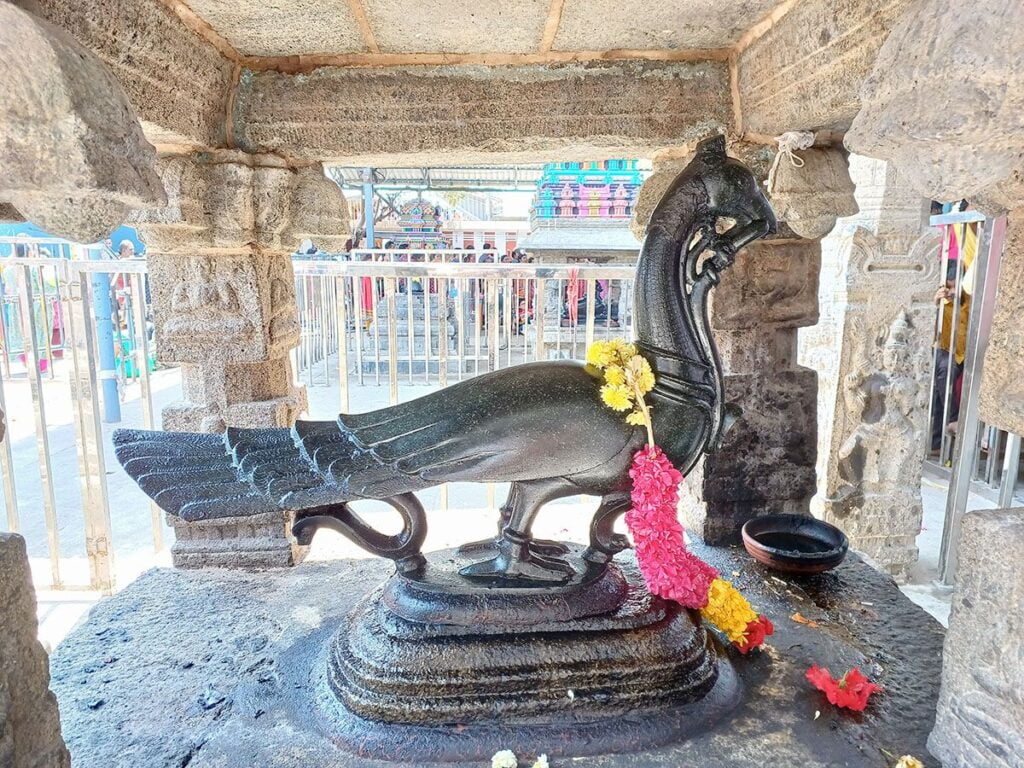
Myths and beliefs of Siruvapuri Murugan Temple:
The Siruvapuri Murugan Temple, also known as Palani Panchamirtha Edapadi, is steeped in rich mythology and beliefs, making it a truly captivating pilgrimage site. Here’s a glimpse into some of the fascinating myths and legends associated with the temple:
The Myth of Palani Hills:
- According to legend, Lord Murugan, son of Lord Shiva and Parvati, once engaged in a playful fight with his brother Ganesha. To test their intelligence, Shiva asked them to circumvent the world. Murugan set off on his peacock, while Ganesha simply circled Shiva himself, claiming victory. Murugan, upon returning, was disappointed and chose to reside in the Palani hills, forever casting a watchful gaze over the world from his abode.
The Five Amritas:
- The temple is renowned for its Panchamirtham, a divine mixture of five nectars: honey, ghee, sugar, banana pulp, and grapes. Each ingredient symbolizes a unique aspect of Murugan’s grace:
- Honey: Sweetness and wisdom
- Ghee: Strength and vitality
- Sugar: Joy and peace
- Banana pulp: Knowledge and learning
- Grapes: Devotion and faith
The Miracle of the Mango Tree:
- A significant legend speaks of a barren mango tree near the temple. Devotees would offer prayers and pour Panchamirtham on the tree, seeking Murugan’s blessings. Miraculously, the tree blossomed and bore fruits after many years, solidifying the belief in Murugan’s power to grant wishes.
The Legend of the Peacock:
- Murugan’s association with his loyal peacock, the divine vehicle Mayil, is central to the temple’s lore. The peacock symbolizes victory, knowledge, and protection, and its image is found throughout the temple complex.
Beliefs and Traditions:
- Devotees visit the temple to seek blessings for prosperity, good health, success in education, and happy marriages. The temple is particularly crowded during festivals like Thai Poosam and Kavadi Attam, where devotees engage in vibrant processions and rituals.
- Offering prayers with ghee lamps and pouring Panchamirtham on the deity are considered auspicious. Devotees also climb the 444 steps to the sanctum sanctorum barefoot, symbolizing their spiritual ascension.
Read More>> Char Dham Yatra – A Complete Guide to Spiritual Destination
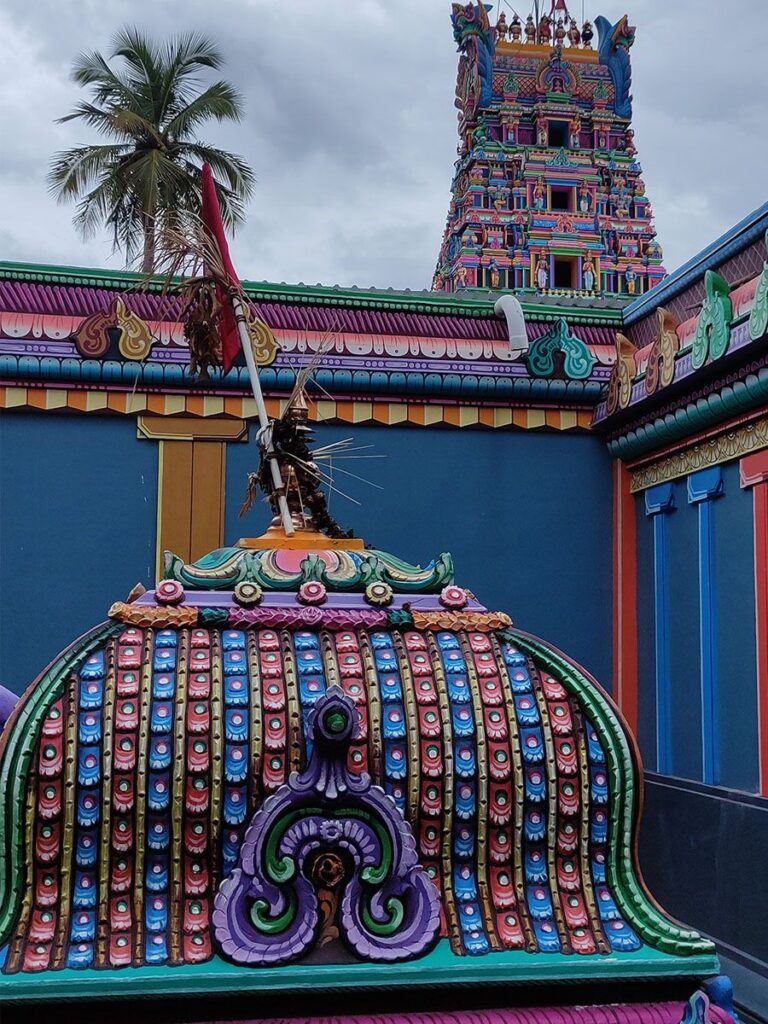
Significane of Siruvapuri Murugan Temple:
Historical Significance:
- Legend of Rama’s sons: One legend associates the temple with Lava and Kusa, the sons of Lord Rama. The story goes that they fought a war with Rama himself without recognizing him, leading the place to be named “Siruvar Por Pori” (meaning “children waged war”).
- Mythological connection: Another legend mentions a devotee named Murugammai, whose unwavering faith in Lord Muruga led to miraculous healing when her husband severed her arms. This event strengthened the belief in Muruga’s power and blessings.
Religious Significance:
- Powerful deity: Lord Murugan, worshipped as Sri Balasubramanyar in this temple, is considered extremely powerful and capable of granting wishes. Devotees seek his blessings for various aspects of life, especially career, marriage, and success.
- Rare murti: The temple houses a unique murti (deity form) of Murugan holding hands with his consorts Valli and Devasena. This rare iconography depicts familial harmony and divine grace.
- Fulfillment of desires: Believers often visit the temple for wishes related to property ownership, particularly buying or building a house. Lord Murugan is known to bless devotees with success in these endeavors.
- Other deities: The temple also houses shrines dedicated to Lord Shiva and Parvati, adding to its spiritual importance and attracting devotees seeking blessings from different aspects of the divine.
Cultural Significance:
- Local festivals: The temple celebrates various festivals like Sani Trayodashi, Kanda Sashti Kavacham, and Skantha Shasti with fervor, drawing large crowds and contributing to the cultural fabric of the region.
- Architectural style: The temple’s Dravidian architecture showcases traditional craftsmanship and adds to its aesthetic appeal.
Read More>> 2500 Years Dwarkadhish Temple: Where Miracles Still Happen
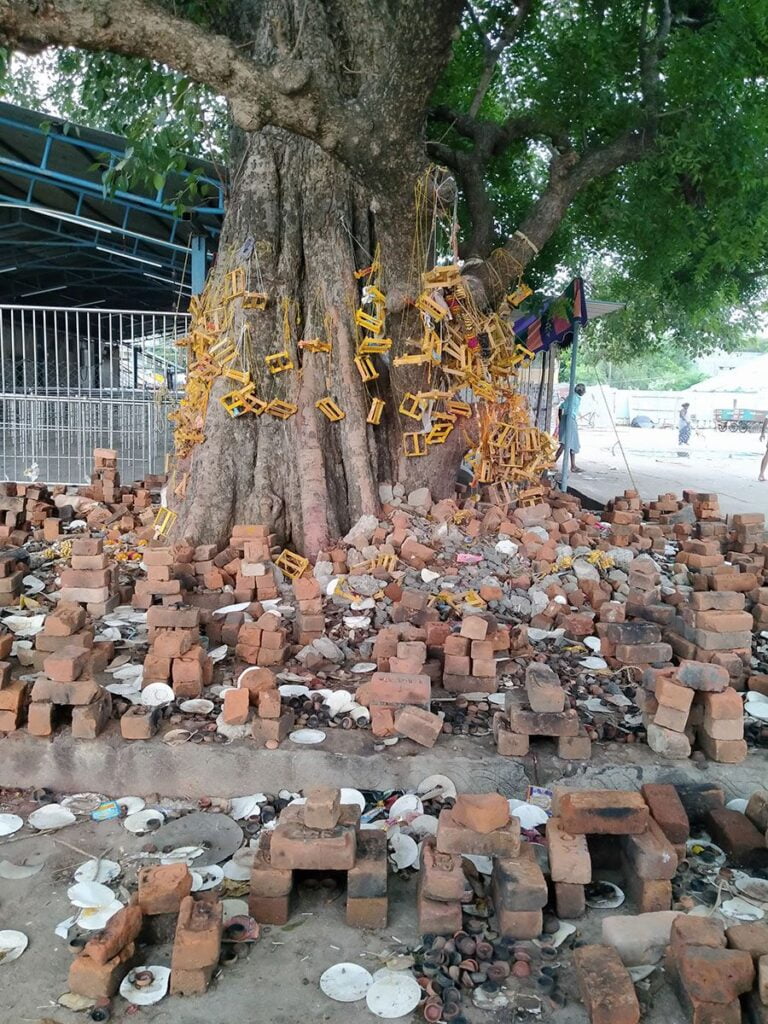
Siruvapuri Murugan Temple Timing and Rituals:
Timings:
- Morning Darshan: 6:00 AM to 12:00 PM
- Evening Darshan: 4:00 PM to 8:00 PM
- Poojas:
- Abhishekam: 9:00 AM and 6:00 PM
- Archana: Throughout the day
- Special Poojas: Available upon request for specific occasions and needs. Contact the temple administration for details and reservations.
Rituals:
- Abhishekam: A sacred bath for the deity performed with milk, curd, honey, ghee, and other items.
- Archana: A prayer offered to the deity with chanting of mantras and holding offering items like flowers, fruits, and incense.
- Saravana Abhishekam: A special abhishekam performed with ghee on Tuesdays and Fridays, believed to be particularly auspicious.
- Vellai Murugan Abhishekam: Another special abhishekam performed during the Tamil month of Karthigai, offering rice and milk to the deity.
- Angapradakshinam: Circling the deity while lying flat on the ground, considered a powerful act of devotion.
- Offering Paal Kozhumbu: A sweet milk porridge offering believed to be especially pleasing to Lord Muruga.
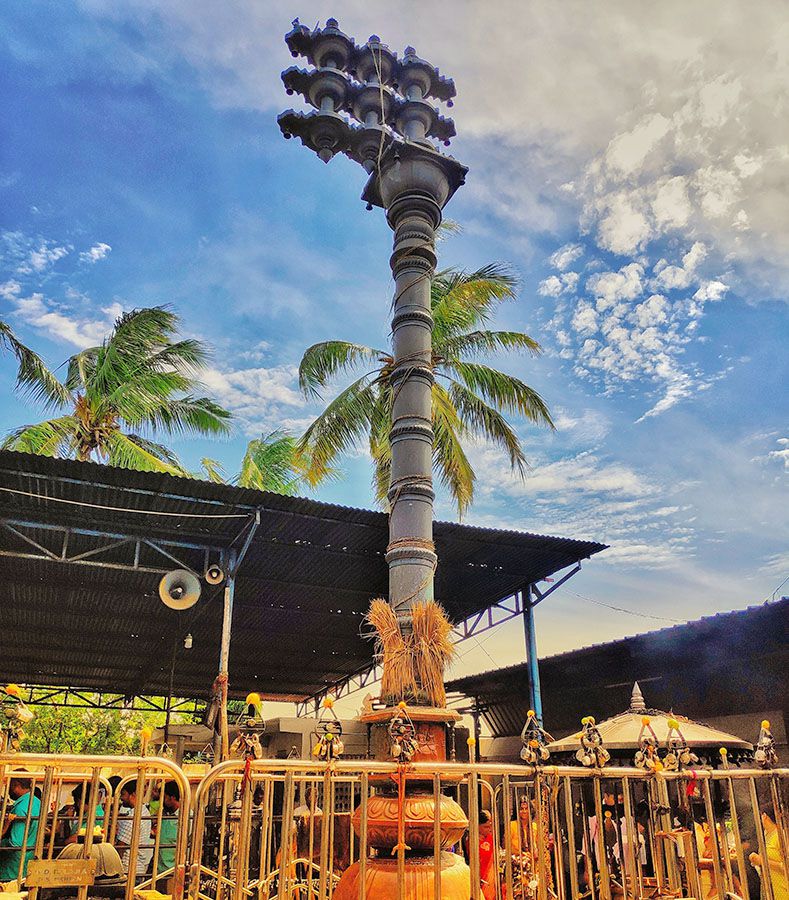
Places to visit near Siruvapuri Murugan Temple:
- Chennai:
- Explore the vibrant city of Chennai, which is known for its cultural heritage, beaches, and modern amenities. Visit attractions like Marina Beach, Kapaleeshwarar Temple, Fort St. George, and the Government Museum.
- Kanchipuram:
- Known for its temples and silk sarees, Kanchipuram is a sacred city and an important pilgrimage site. The Kanchi Kailasanathar Temple, Varadharaja Perumal Temple, and Ekambareswarar Temple are among the notable places to visit.
- Mahabalipuram (Mamallapuram):
- Famous for its UNESCO World Heritage-listed monuments, Mahabalipuram is known for its rock-cut temples and sculptures. The Shore Temple, Arjuna’s Penance, and the Five Rathas are must-visit attractions.
- Pulicat Lake:
- Located about 60 kilometers north of Chennai, Pulicat Lake is the second-largest saltwater lagoon in India. It is a haven for birdwatchers, with various migratory birds making a stop here.
- Vedanthangal Bird Sanctuary:
- If you are interested in birdwatching, Vedanthangal Bird Sanctuary is a short drive from Siruvapuri. It is one of the oldest water bird sanctuaries in India and is home to a variety of migratory birds.
- Tirupati:
- Tirupati, famous for the Tirumala Venkateswara Temple, is one of the most visited pilgrimage destinations in India. It’s about a 3-4 hour drive from Siruvapuri.
- Sriperumbudur:
- Visit Sriperumbudur, the birthplace of former Indian Prime Minister Rajiv Gandhi. The Rajiv Gandhi Memorial is a key attraction in this town.
- Kalahasti:
- Kalahasti, known for the Srikalahasteeswara Temple, is another prominent pilgrimage site. It’s famous for its Vayu Linga, dedicated to Lord Shiva.
FAQ:
Temple and Deities:
- Who is the presiding deity of the temple? – Lord Murugan, also known as Karthikeya, is the main deity of the temple. He is worshipped in his six-faced form, Arumugam.
- Are there any other deities in the temple? – Yes, there are smaller shrines dedicated to Lord Ganesha, Valli and Deivanai (Murugan’s consorts), and Navagrahas (nine planets) within the temple complex.
What is Siruvapuri Murugan famous for?
Granting wishes: Devotees believe Murugan here fulfills your desires, especially related to owning a home.
Standing Murugan idol: The main statue is unique – a 4.5 ft tall Murugan in a standing position.
Maragatha Mayil: A stunning emerald peacock, Murugan’s vehicle, adds to the temple’s charm.
Powerful blessings: Many devotees visit to seek blessings for success, good health, and overcoming obstacles.
Visiting the Temple:
- What are the timings of the temple? – The temple is open from 6:00 AM to 12:00 PM and 4:00 PM to 8:00 PM daily.
- What days are most crowded? – Tuesdays and Fridays tend to be busier, especially during festivals and auspicious occasions.
- Are there any special pujas or festivals celebrated at the temple? – Yes, the temple observes the following special occasions:
- Kanda Sashti: Six-day festival celebrated in October-November honoring Lord Murugan’s victory over the demon Tarakasura.
- Thai Poosam: Festival celebrating Lord Murugan’s birth, usually falls in January-February.
- Skanda Shashti: Another six-day festival in June-July celebrating Lord Murugan’s various battles.
- Monthly Sashti pujas every Friday dedicated to Lord Murugan.
Temple Rituals and Offerings:
- What offerings are recommended for Lord Murugan? – Milk, honey, fruits like banana and mango, sandalwood paste, vibhuti (sacred ash), peacock feathers are typical offerings.
- Can I perform abhishekam or other special pujas for Lord Murugan? – Yes, the temple priests can perform various pujas as per your request and specifications. Contact the temple administration for details and booking.
- Are there any dress code restrictions? – It is recommended to dress modestly, preferably in dhotis for men and sarees or salwar kameez for women. Avoid wearing revealing or brightly colored clothes.
Additional Information:
- Is there parking available near the temple? – Yes, there is limited parking space available near the temple entrance.
- Are there any accommodation options near the temple? – There are a few lodges and homestays in the vicinity. You can also find hotels in Chennai, which is about 20 km away.
- Is the temple easily accessible for people with disabilities? – The temple premises are generally accessible, but there might be some challenges due to steps.
How to reach Siruvapuri Murugan Temple:
By Air:
- Chennai International Airport:
- The nearest major airport is Chennai International Airport.
- From the airport, you can hire a taxi or use other local transportation options to reach Siruvapuri Murugan Temple.
By Train:
- Chennai Central Railway Station:
- Chennai Central is a major railway station in the area.
- From the railway station, you can hire a taxi or take a train to the nearest railway station to Siruvapuri (Tiruvallur or other nearby stations).
By Road:
- Chennai:
- Siruvapuri is approximately 40-50 kilometers from Chennai.
- You can take a taxi or use other public transportation from Chennai to reach the temple.
Local Transportation:
- Taxi/Cab:
- Taxis or cabs can be hired from Chennai or nearby areas to reach Siruvapuri Murugan Temple.
- Public Buses:
- Public buses may be available from Chennai or nearby towns to Siruvapuri. Check with the local transportation authorities for the most accurate and up-to-date information on bus routes.
- Auto Rickshaws:
- Auto rickshaws are a common mode of local transportation. You can use them for shorter distances within the town.
